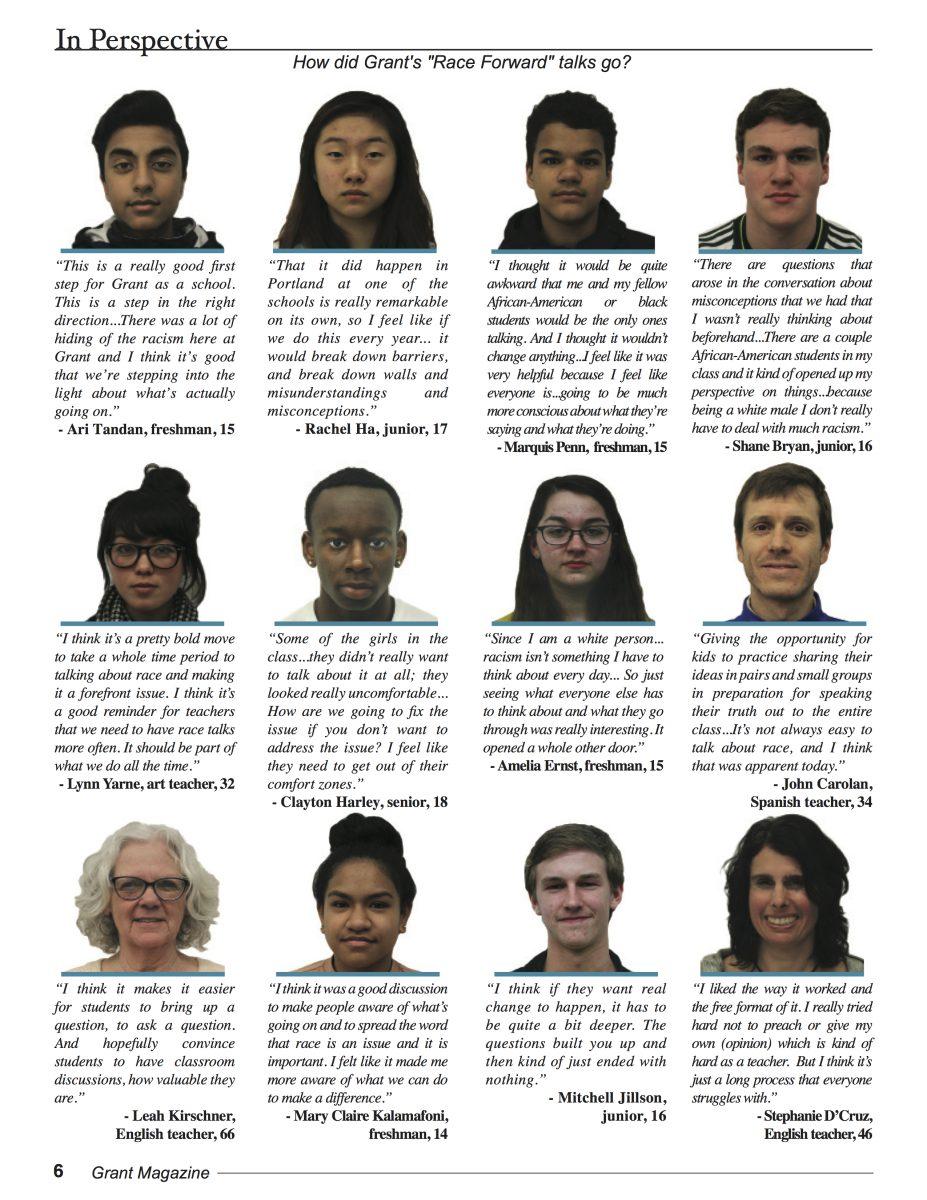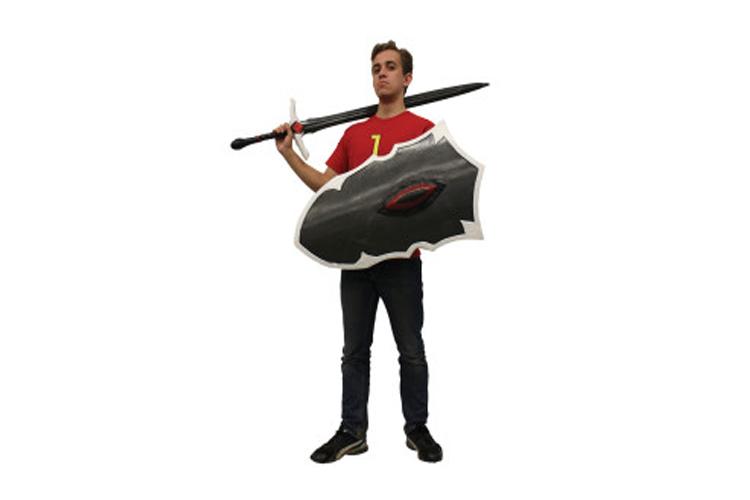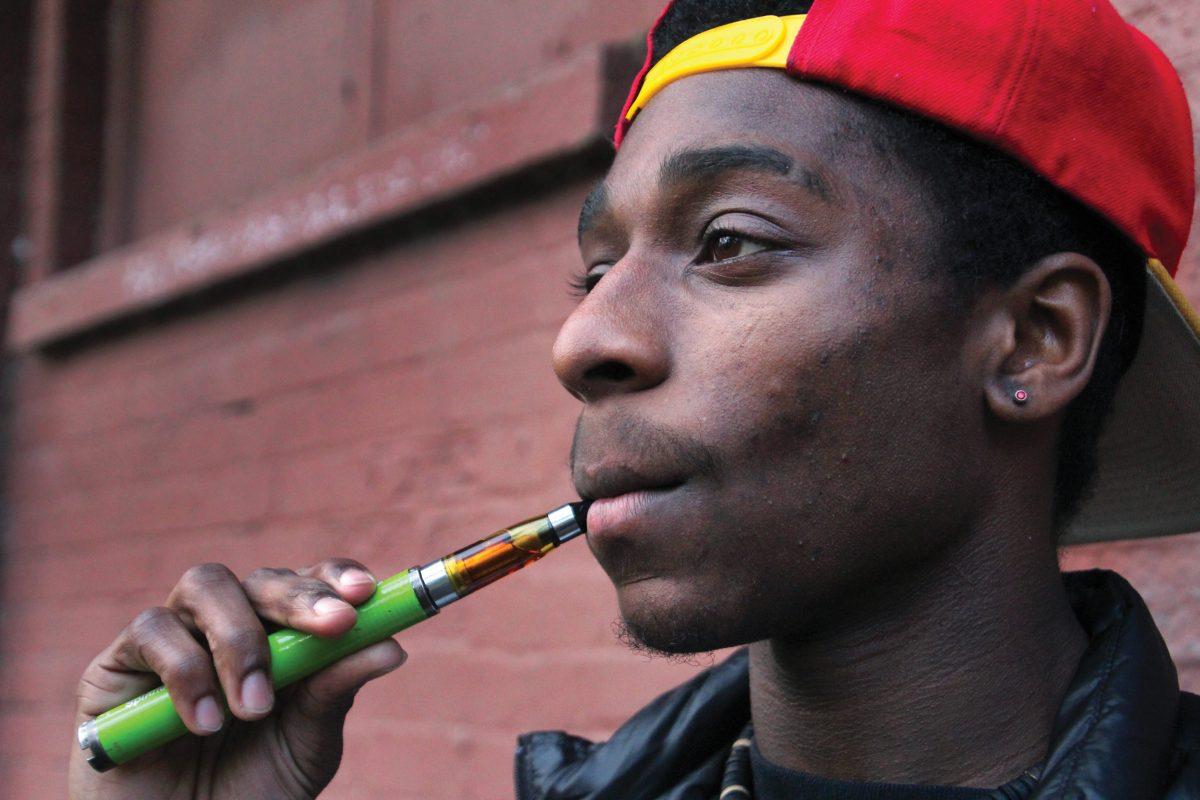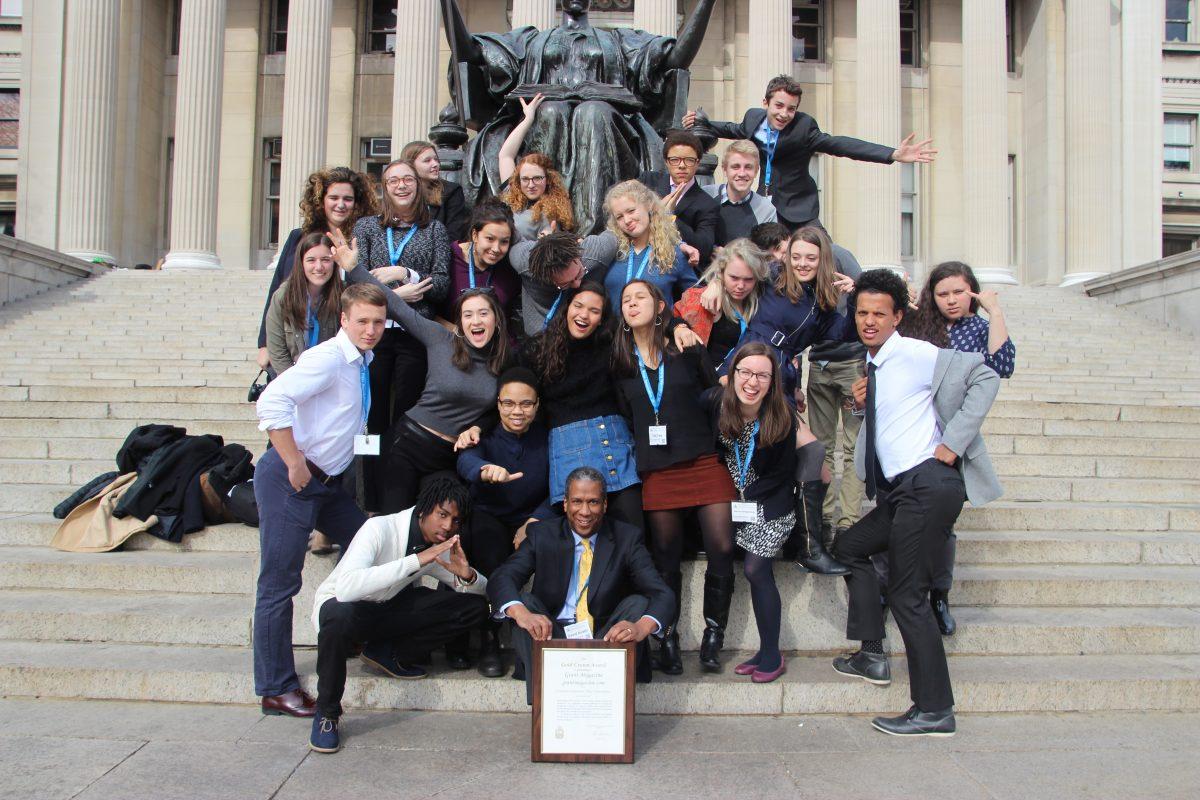Hixon Dorsett remembers kicking back on a dorm room couch in Mitchell, a town located in North Central Oregon. He was visiting his sister, Chloe, a boarding student and resident of the small town of about 200, on her 18th birthday.
Chloe was happy to see her brother again, he recalls, and he remembers how she walked over to him, grabbed him by the leg and wrestled him to the ground. The two exchanged playful, yet practiced, chokes and holds in a spontaneous match. Both have practiced the grappling-based martial art Brazilian Jiu-Jitsu since they were small kids.
Hixon Dorsett, a Grant High School freshman, recalls the play fight that day as a sobering, yet uplifting reminder of the bond between him and his sister. Chloe had been in and out of drug rehab since her freshman year of high school in 2012. At the time of her birthday, she had eight months of being clean and sober. And by mid-March, she had reached 13 months without using drugs or alcohol. But a recent slip has left her situation shrouded in uncertainty.
Now, he’s worried. He says he sees glimpses of their past relationship and feels that it might be coming back. But the latest setback has him searching for answers he may not find. “I just hope she…starts over, ya know,” he says. “She’s a grownup. Grownups make mistakes. I hope she finds something.”
For Dorsett and his family, a life “on the mat” has been the norm; even his name came from Jiu-Jitsu legend Rickson Gracie. But despite a lifetime of grappling with physical opponents, their largest fights have come outside the ring.
Born March 24, 2001, to parents Eric and Shy Dorsett, Hixon Dorsett was never a follower. Ever since his grandmother taught him to paint at the age of two, he’s been thinking outside the box; his self-described “eclectic” style was evident even in his formative years. Soon, painting wasn’t enough for the young Dorsett.
“You’d just give him a glue gun and a bunch of junk, and he’d make something out of it,” recalls his grandmother, Katie Swan.
While other children grew up carrying pencils and boxed lunches around their pre-kindergarten classrooms, Dorsett and his sister grew up carrying lizards and rats from their father’s reptile warehouse. While most children his age were enjoying naptime, Hixon was decked out in a Spiderman costume, surrounded by boxes of scaled creatures, eyes glued to Alien movies on a flickering screen.
It was on one of these days, in 2005, that Dorsett’s father received a call from an old friend and former martial arts training partner, Tom Oberhue.
“Hixon’s gotta be four now, right?” asked Robinson. When Eric Dorsett affirmed the age, Oberhue responded promptly, “Old enough to do Jiu-Jitsu.”
At the time, Eric hadn’t donned a gi – the formal Japanese name for a martial arts uniform – in 10 years. “I was working in outside sales in the beauty industry,” he recalls. “It was hard to go out and sell hair color with black eyes.”
Still, the call sparked a wave of nostalgia for Eric Dorsett, who had practiced multiple martial arts for nearly three decades. He remembers how his infatuation with Brazilian Jiu-Jitsu easily moved it ahead of other fighting styles.
It was at a 1993 Salem seminar conducted by Rickson Gracie, brother of UFC champion Royce Gracie, that Eric Dorsett was first introduced to the martial art. Although impressed, Dorsett did not truly fall for the sport until Gracie agreed to wrestle every attendee in the room.
“He’s wrestling these big guys, guys that were collegiate wrestlers,” Eric Dorsett recalls, gesticulating with his thick, muscled arms to mimic the moves that submitted wrestlers much larger than Gracie.
At 6-foot-4 and powerfully built, Eric Dorsett wasted little time in following his newfound passion. Every few months, he would drive more than 900 miles to Inglewood, Calif., to train – and sleep – at Rickson Gracie’s gym. Dorsett also started an underground training club known as the Lost Parks Society.
When Robinson called in 2005, it gave him the chance to spread that passion to his son. He couldn’t let it pass. Hixon Dorsett began training soon after.
While the training for a young martial artist is mainly based on games and basic positioning, Eric Dorsett was an experienced martial artist and a full time father. He knew how to keep Hixon on track but recognized that he needed to develop a fighter’s instinct on his own. “He’s a lover, not a fighter,” says Eric Dorsett. Hixon, hearing the comment from across the living room of their Northeast Portland home, smiles and shrugs.
While the training was going well, the Dorsetts’ world took a huge hit in the summer of 2009. Dorsett and his sister were at his grandmother’s house in Lake Oswego, a place they often stayed while their father worked. Although their parents had divorced years before, with Eric maintaining custody, Chloe and Hixon still saw their mother on certain special occasions. Shy Dorsett’s birthday was coming up, and she was planning on meeting up with her children later that night.
While his dad worked, Hixon Dorsett toiled over a painting he had planned on giving his mom as a birthday present. It was an image of Garfield the cat relaxing on a pillow against a cool blue sky. The painting was complete, save a small section of the sky. That’s when Eric Dorsett came to the door to pick up his children.
Hixon was quick to point out the near complete painting. “Hey, dad, look at it. I’m almost done,” the excited Dorsett said, proudly holding up his creation. His dad sat down, tears welling in his eyes. “That was really surprising to me. I hadn’t seen him cry,” Hixon Dorsett remembers.
He asked why his dad was crying and Eric Dorsett dropped the news. The canvas dropped to the floor. Shy, who had struggled with addiction for several years, had died from a drug overdose earlier that day.
Katie Swan, his grandmother, immediately went to help the Dorsett siblings. She started taking them to the Dougy Center for Grieving Children twice a month. Dorsett’s resilience and creativity was not lost on the supporters of the center.
“It gives you the confidence to not fight. Hixon never got in a fight. Why? Because (he fights) every day on the mat.”- Eric Dorsett, father
“Every year, they would have an auction… and so every year, Hixon would make something, and he always got this astronomically high price for it because he was so engaging to the people who would ask him about it,” says Swan.
The time at the center paid off. At age 9, Dorsett finally completed his mother’s painting. “It deserved to be finished,” says Dorsett now. In honor of his mom, he left a pencil message for anybody who wound up with it: “Whoever has this, take good care of it.”
He remained heavily interested in Jiu-Jitsu as well, almost to a fault. “He kinda goes out there; he’s like,‘alright, it’s going to be fun,’ and the other dude is across the ring like, ‘I’m going to kill him,’” says Eric Dorsett. But despite his light-heartedness, Hixon was no joke in the ring. Neither was his sister, who had started training shortly after him. In little time, they were making their marks in competition.
Their victories on the mat instilled a strong sense of pride in their father, as well as their stepmother, Jessica Sexton, who also competed in Jiu-Jitsu.
Soon after, at age 14, Chloe made a large leap in her fighting career. “(Teenage boys) didn’t want to lose to girls, so they would just hold her on the ground, squeeze her head and there would be no match,” says Eric Dorsett. Frustrated with the stalemates, Chloe decided to make the leap to the adult women’s division. “She went out, and she started smoking people,” her dad remembers.
In her sophomore year, Chloe went undefeated in the Northwest, winning every major tournament in the region. Not to be outdone, Hixon grabbed his share of success in the kids division.
In a tournament ran by the North American Grappling Association, katanas – Japanese swords – are handed out as the first-place prize. Hixon Dorsett fought in three different divisions to achieve a coveted blade. Victory finally came against an opponent, who was much larger than Dorsett, in a fighting style he hadn’t practiced in three years. “I hadn’t won anything; I was really sad… and then I thought ‘I’m gonna win,’” recalls Dorsett, proudly brandishing his red hilted katana, which he keeps to this day.

However, life outside of the ring was not coming as easily. The Dorsett siblings had been thrust into social atmospheres that proved difficult for both: for Hixon, middle school at Mount Tabor, and for Chloe, high school at Grant.
Hixon Dorsett came to school each day in button up shirts, bowties and suspenders. He maintained an interest in Dragon Ball Z and Harry Potter, while his peers paid more interest to
their images and social status. They began to harass Hixon for his “immature” interests. Although hurt by the bullies, he remained true to himself. “I would just sometimes go the library and like pass out or read a book, or pretend to read a book and stare off into space,” he recalls. “I tried to ignore those people and not let it get to my head too much.”
Meanwhile, Chloe had a difficult time finding her social group in high school. “The friends that I sought weren’t the best friends to have,” she says. By mid-year, she had begun to experiment with hard drugs. Soon after, the experimentation turned into addiction.
With school, and now home, becoming increasingly unstable for Hixon Dorsett, he turned to his grandmother for support. The two spent countless afternoons together. “People would go, ‘Why do you wear that bow tie?’ He’s like, ‘Because that’s who I am.’ He has an inner strength, that he’s able to be himself,” says Swan.
On days when he felt uncomfortable at home, Dorsett would take long walks to reflect on his conversations with his grandmother.
In fall of 2013, Chloe dropped out of Grant. The months that followed were an odyssey of alternative schools and treatment centers. However, in a tempest of drug-induced turmoil, the Dorsett siblings found the eye of the storm with each other.
One day, in an argument with family, Chloe jumped out of her bedroom window and decided to run away. But, with nowhere to stay the night, she turned back toward home several hours later. Blocks from her house, she could hear a familiar voice calling her name. It was her brother, sitting on the brick wall surrounding their front yard, waiting for her return.
“He had stood out there and was worried and was looking for me,” recalls Chloe.
When Chloe came into view, her brother’s eyes lit up. “Chloe come here! We need you!” he said, and then ran inside, shouting, “Dad, Chloe’s back!”
But the two siblings had to go their separate ways in the summer of 2014. A blowout landed Chloe in rehab again, and it was there that she received a call from her family: until she got sober, home was not a place for her to stay. “Eventually, it does catch onto you… you don’t forget those words,” she says.
Swan remembers the thinking behind the decision. “She needed to be completely out of her element in order to find out who she was,” she recalls.
It worked. Chloe landed herself in the John King Sobriety House in Mt. Vernon, Wash., and shortly after, the Mitchell School, the boarding school in Mitchell. She stayed sober for over a year and was on track to graduate on time.
But with the latest relapse, that goal is in jeopardy. The incident took her out of her boarding school, and now she’s looking for new options. She’s moved to stay with her aunt on the outskirts of Boise, Idaho.
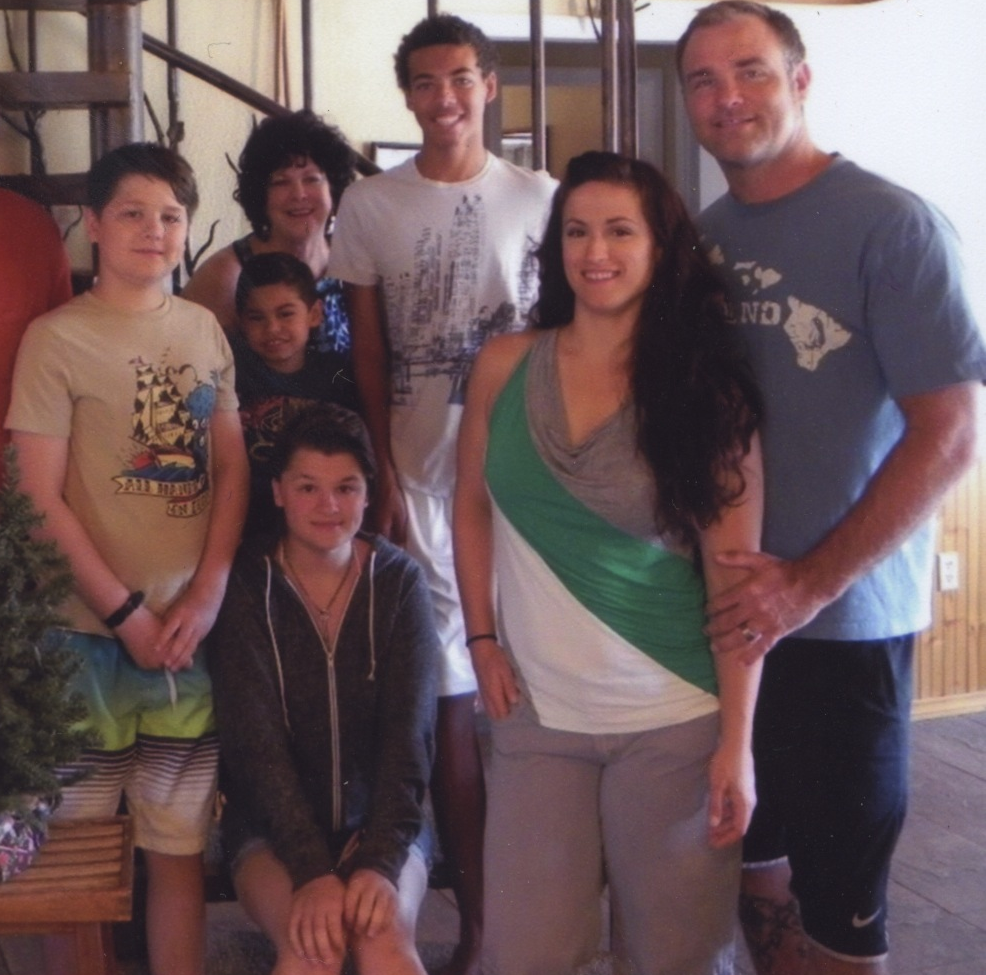
“In the way of really trying to snap myself out of bad habits and some things, it’s good to get myself away from the environment and collect myself. I think it is good,” she says. She plans on working to earn enough money to continue school in the fall.
Sometimes, when she’s having a hard day, she goes on walks.
Hixon Dorsett is concerned for his sister. But he sees an upside to the situation. “Now she has to get out into the world instead of living in the middle of nowhere…she’s kind of getting into the groove of being back in the actual world,” he says.
Throughout the experience, he’s held his composure. His dad believes Hixon Dorsett’s years of Jiu-Jitsu training helped his son keep a level head. “It gives you the confidence to not fight,” his dad says. “Hixon never got in a fight. Why? Because (he fights) every day on the mat.”
He’s grown nearly five inches since graduating middle school and has opted to leave behind his ties and suspenders. Not because he was pressured to, but because he wanted to.
Wearing a pair of Nike Flyknits, joggers and a grey Columbia jacket, the 5-foot, 11-inch, Dorsett has begun to fill out a broad frame similar to his father. “Middle school, I was kinda more worried about my social status, like why don’t people like me…I’m in a better groove,” Hixon Dorsett says now.
After holding true to himself through middle school, bullying is absent from Dorsett’s life. He’s turned his attention from family and social issues to his own success. He’s got “bigger fish to fry” with his schoolwork, and like everything else, he’s taking it in stride.
The Dorsetts have always linked their ability to move on with their ability to reflect on struggles overcome. And now they face another one. But they’re up to it.
Around their family residence, you’ll find the past’s bittersweet footprints. A Ben 10 watch, given to Dorsett by his mother for Christmas, now sitting in his display case. The Garfield painting, now hanging in his grandmother’s Lake Oswego home. They don’t serve to bring Dorsett painful memories. Rather, they remind him how adversity has made the family stronger.
Reflecting on the past few years, Swan wouldn’t have it any other way. “We’ve been through lots of hard things,” she says. “And my belief is that it makes you resilient; it makes you interesting. It makes you the kind of person that people want to know.” ◊




























